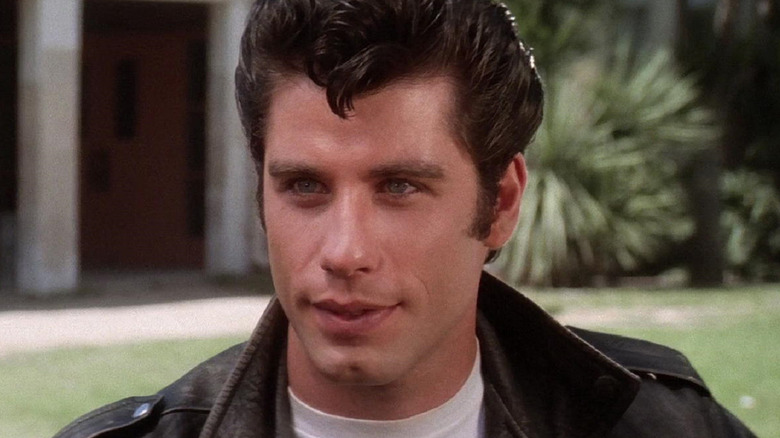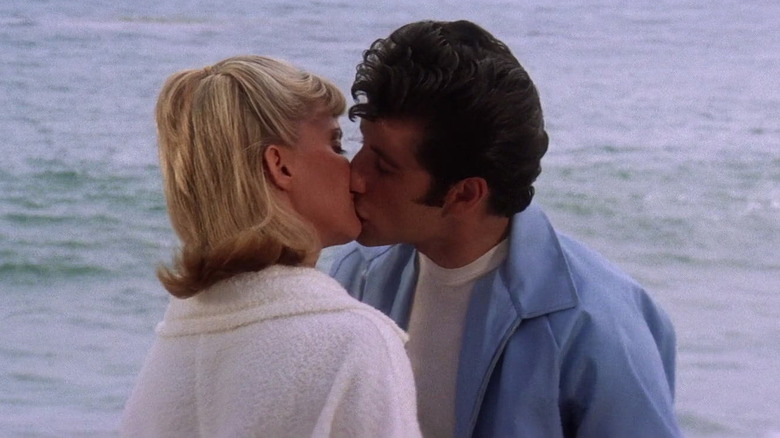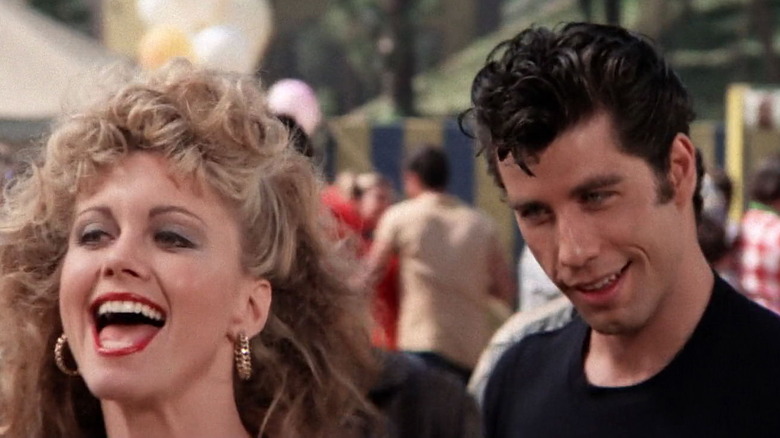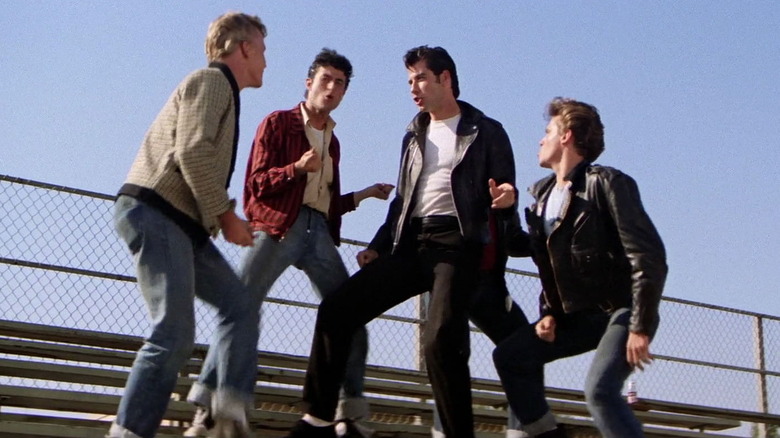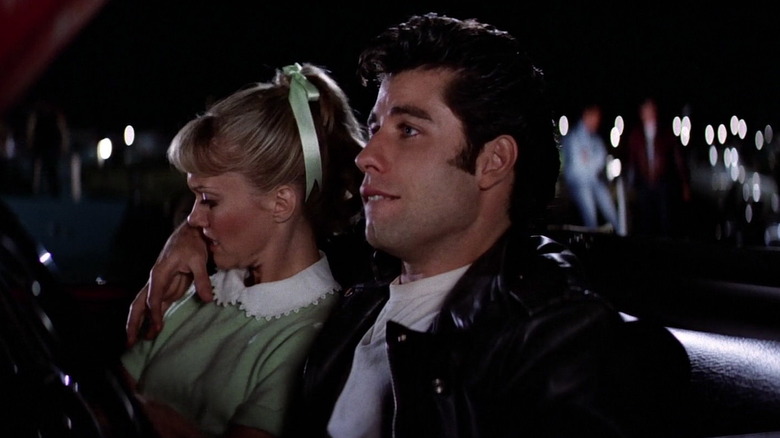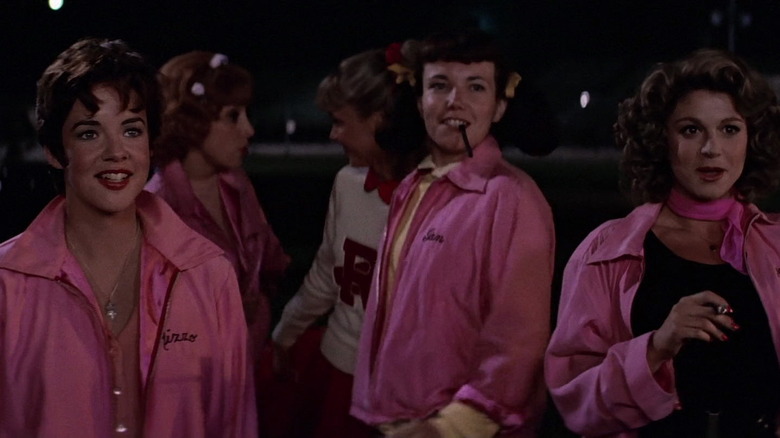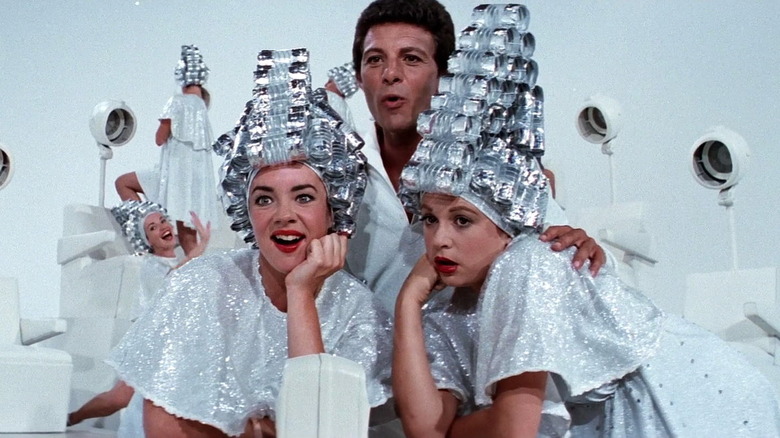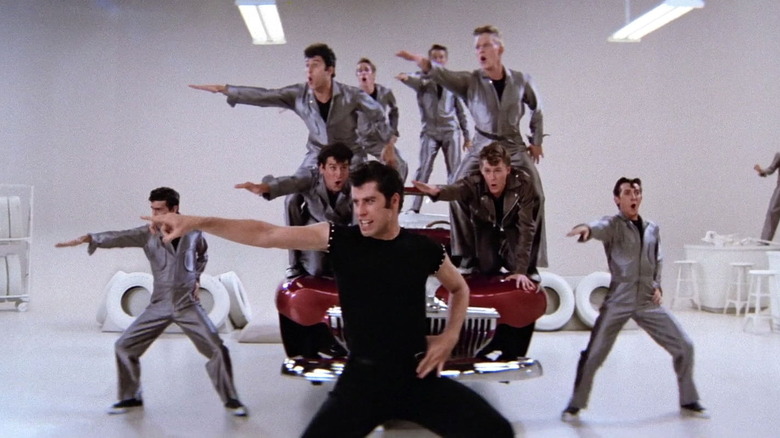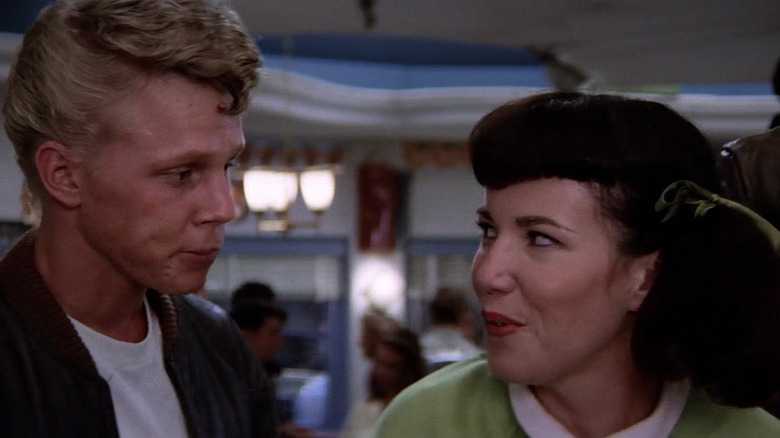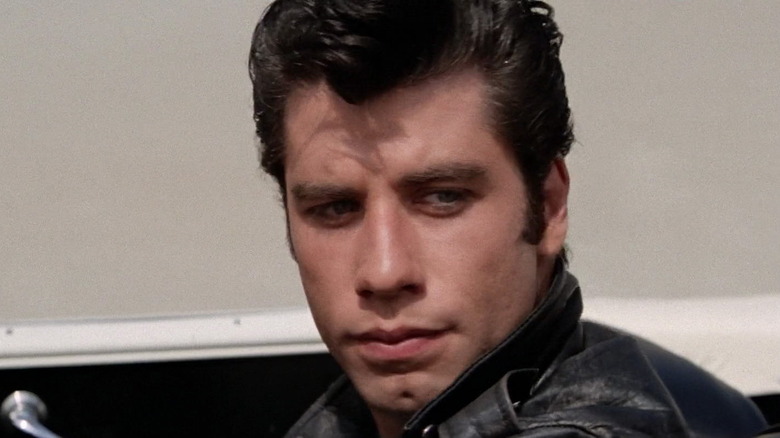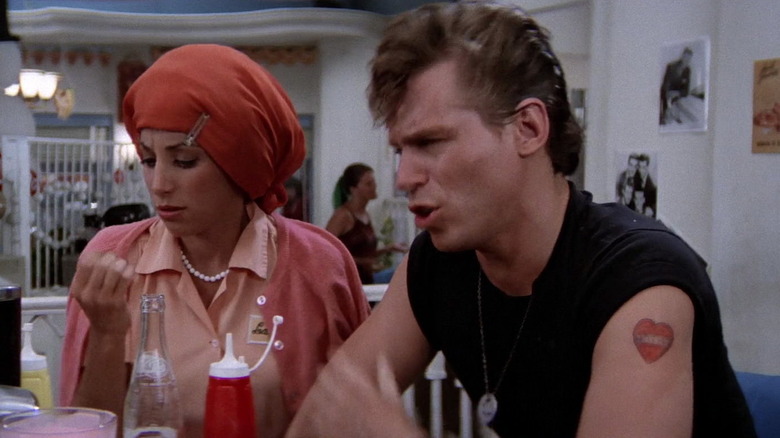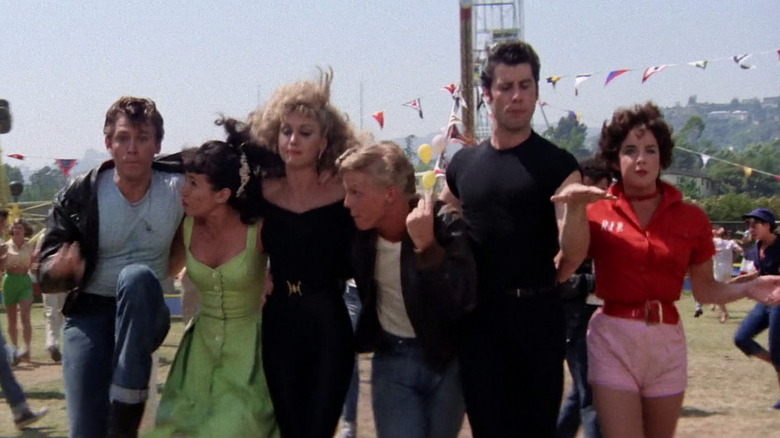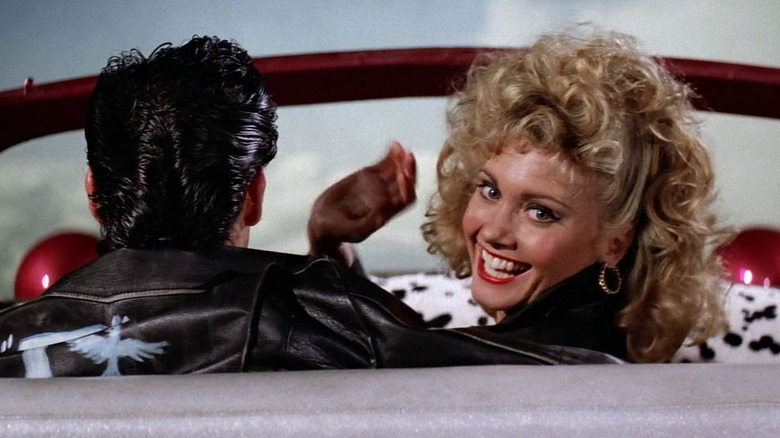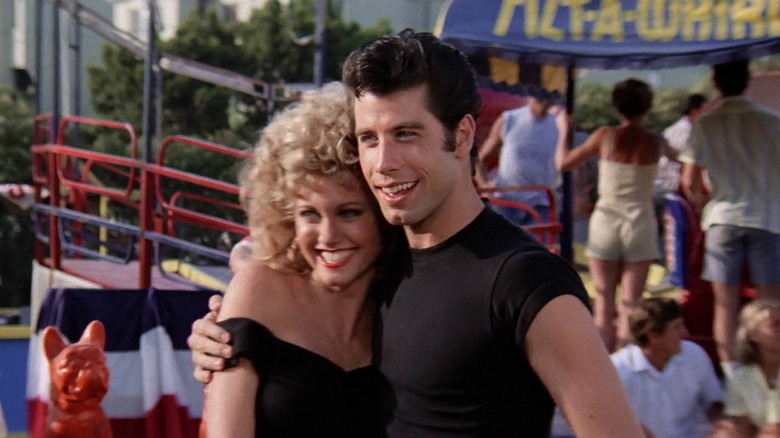Dumb Things In Grease You Only Notice After Watching It More Than Once
There's so much going on in the classic movie-musical "Grease" that it's easy to miss the more insidious aspects during the first watch, especially if you were a kid the first time you saw it. What seems like a fun and funky musical actually has a lot of depth to it. The film exists as an often satirical and boundary-pushing commentary on the demure sexual ideologies of the '50s with a subtle dash of '70s-inspired female empowerment. The contrast between the ideas associated with each decade is palpable throughout the movie, which was inspired by the 1972 Broadway production of the same name.
Like its characters, "Grease" spends nearly two hours trying to figure out precisely what it is, and viewers still aren't quite sure by the end. Between satire, magical realism, and cartoonish absurdity, the movie toggles back and forth between being a realistic teen romance and a confusing fever dream. And yet, somehow, it mostly works. "Grease" makes audiences feel the confusion of being a teen laced with the rapidly changing ideals of a time period in permanent flux.
And though the movie is groundbreaking both in its filming choices and themes, by 21st Century standards, there are plenty of moments that are misogynistic, creepy, and hard to watch. Other times, it just doesn't make sense. Sometimes, it takes more than a single watch to notice them all.
Summer lovin' (and losing)
Australian girl meets boy on vacation, they have a summer romance, girl stays in town, girl is somehow surprised to see boy at school? "Grease" sets up its meet-cute rom-com shtick pretty early, but summer lovin' aside, it makes no sense. Sandy and Danny meet when she's on vacation, and based on the details from the film, it appears that they meet in his hometown. Yet when her family decides not to go back to Australia, she reminisces about her whirlwind summer romance as if she'll never see Danny again. It may be the '50s before Facebook was all the rage, but the couple obviously had no issues communicating with each other all summer.
It stands to reason that Sandy has to know where Danny lives and-slash-or where he hangs out and-slash-or his phone number. Not only is her shock at finding out that he attends her new school far-fetched, but what's with the drama about never seeing him again? Even if they met outside of his hometown, logically, he'd have mentioned where he's from during their time together. Their second meet-cute just isn't believable, and the set-up seems to be an excuse for "Summer Nights." Now, the song is just the most, so we'll let it slide. After all, what would karaoke be without this jam? But let's not pretend the plot makes any sense.
Wait, how old are you again?
Casting adults in teen roles is a tale as old as Hollywood, but that doesn't make it any more believable. In reality, teens tend to be awkward, gawky, and full of blemishes. Yet, rather than depicting teenagers as they are in real life, Hollywood prefers to cast actors well out of puberty. Not only are the already-massive insecurities of actual teenagers enhanced by the unrealistic representations of their demographic routinely appearing in mass media, but it's ridiculous to watch.
Olivia Newton-John was 29 and John Travolta was 23 when they filmed "Grease" — neither of them pulled off convincing 18-year-olds. The movie gets away with Newton-John's age a bit more as Sandy's wardrobe, hairstyle, and makeup scream "shy, innocent teen." But even in some instances, like the beach scene, it's hard not to notice her age. When it comes to Danny, he's styled to ramp up his apparent maturity — teenagers often try to pass as adults, after all — so even though Travolta was younger than Newton-John, he scans as a little older. Rizzo actress Stockard Channing has them both beat, however. She was 33 during filming. Despite the age discrepancies in "Grease," the movie is an iconic classic — many fans just can't picture anyone else in those roles.
The missing draft
While the U.S. was peripherally involved in the Vietnam war in 1954, the film's 1959 story occurs before the U.S. took a significant role in the war in the early '60s (history.com). Although Danny Zuko and the T-Birds would have a couple of years before the war became the most significant component of their place in history, according to the Selective Service System, over 96,000 men were inducted into the military in 1959.
Let's face it, none of the T-Birds seem like the military type, given their love of rule-breaking, leather jackets, and slicked-back hair. Yet none of them seem all that concerned about possibly getting drafted, which would likely be on every 18-year-old's mind during the active drafts until 1973. We know Danny just turned 18 at the film's start, and the rest of the guys are also seniors.
It would make sense for them to broach the subject at least once during the movie, especially given that the movie was filmed a few years after the draft disbanded and the Paris Peace Accords put an end to the Vietnam War. The movie may take place in the late '50s, but its filming in the late '70s makes it surprising that none of these subjects are broached — especially given the '70s-centric themes littered throughout the movie.
Rapey undertones aren't cute
Consent isn't a joke, kids. But that doesn't stop Hollywood from treating it as such. In some ways, "Grease" was way ahead of its time in countering some of the '50s' long-held ideas about sex and innocence. However, "Grease" is still a product of its time — as in, a product of the decade in which it's set (the '50s) and the year it was filmed (1978). Hell, the #MeToo era of Hollywood didn't become a part of pop culture lingo until around 2017, though the term was first used over a decade prior by Tarana Burke. Given that these conversations barely made headlines until the turn of the millennium, it's not surprising that decades-old films have consent issues.
Now, that doesn't mean we can't still love them. But it's important to have these discussions about our nostalgic faves nonetheless. Plenty of "Grease" moments toggle between cringe and downright assault. Between a student looking up a girl's skirt in "Summer Nights," a T-Bird aggressively forcing Sandy to dance with him during the dance competition, and Danny assaulting Sandy in a car, the Rydell High kids could use a serious conversation about consent. It's not even just the teens, either. Vince Fontaine tries to hook up with a teenager during the dance by luring her in with his fame. Now, the T-Birds playfully hold the skirt-snooping bleacher student accountable with a water gun, but the playfulness undercuts the severity of his actions.
Matching outfits: Hot or not?
Be honest: If a high school clique dressed in matching getups with the name of their self-titled group emblazoned for all to see, they'd probably be the first kids shoved in a locker, right? Sure, the T-Bird and Pink Lady jackets are fun 'n all, especially on Halloween, but there's no way that the "cool" cliques in high school would get away with matching outfits. Not only would they get mercilessly mocked, but the very fact that they have matching outfits would prevent them from reaching cool status to begin with.
Unless it's a varsity jacket, no teenagers are admired for this kind of branding. And although their goofy outfits would lead to knuckle sandwiches in reality, fans want to feel like they're members of Rydell High's most exclusive cliques, so we stock up on Halloween and ignore the silliness of it all. After all, there ain't no rules at Rydell High.
Taking satire too far
Satire is fun and quirky when it works for the story, but "Grease" has an identity crisis during more than a few scenes in the film. The movie can't quite decide between realism, satire, and magical realism, which makes its events jarring at times. For instance, "Grease" establishes the machismo energy between the T-Birds and their rivals early on, but no one ever addresses how ridiculous the feud is or how absurd the gangs look. Satire is an effective tool when the subject being criticized is clear. In some ways, the film mirrors the rapidly changing ideals of the late '70s, which clash with the film's '50s setting. It can't quite decide where it stands, though, and that makes the satirical elements clunky and confusing.
Additionally, the gossip surrounding Rizzo's pregnancy scare spreads to basically the entire class in a matter of seconds. But, like the feuding gangs, it feels out of place. And as fun of a number as "Beauty School Dropout" is, the sequence is equally jarring — although the daydreaming aspect of the scene makes it resonate as a bit more sensical than other, similar scenes in that there's a logical explanation for what we're seeing.
Greased lightnin' or greased orgasm?
Between the repeated "oh"s in "Greased Lightnin'" and the fact that the T-Birds call the car a "p**** wagon" (come on, guys), it's not exactly subtle that the song is a metaphor for an orgasm. And if that isn't clear enough, the "chicks will cream" line should do the trick. The only people who don't notice what the song is trying to relay are children and anyone who failed the allegory section of ninth-grade English. While it's safe to say that everyone eventually figures it out, getting caught up in how much of a bop the song is hides the more intense parts of the metaphor during a first watch.
And hey, who hasn't bonded about sex with the rest of their shop class while gyrating and enjoying a shared daydream? Most of this film is best enjoyed without thinking about it too hard — double entendre be damned.
Fat-shaming at its finest
Fat-shaming just isn't the foreplay it's chalked up to be. There are more than enough issues in Sandy and Danny's relationship, but they're not the only couple that needs to reevaluate their pillow talk. Women in the '50s had a host of unreasonable expectations to live up to, from perfectly curled hair to having dinner on the table at 7 p.m. every night. As a result, body positivity wasn't exactly the first priority in most relationships.
Putzie and Jan are somewhat of a blink-and-you'll-miss-it kind of couple, but their short getting-together diner scene leaves a lot to be desired. Putzie tells Jan that there's more to her than just fat, and she's somehow charmed by that backhanded "compliment." She almost immediately mentions dieting after the exchange, and Putzie is framed like a hero for deigning to date someone he deems as defying beauty standards. And that's not even taking into consideration that Jan isn't even visibly overweight. What kind of message has this moment been sending young women for decades?
Danny Zuko or Elvis Presley
Despite Elvis turning down the role of Teen Angel (via Express.co.UK), the King of Rock and Roll is ever-present in the DNA of "Grease." Like "Bye Bye Birdie," the entire musical is clearly inspired by the singer. John Travolta emulates the gone-too-soon icon with every morsel of his character, from his greased-up hair to the singer's iconic drawl. The homages range from subtle to downright distracting, and it's clear that Elvis himself provided the blueprint for Danny Zuko. Yet Elvis died the very same year the movie was filmed, so even if he had said yes to Teen Angel, his scenes might never have been finished.
In fact, Elvis died the very same day Stockard Channing filmed the "Look At Me I'm Sandra Dee" scene in which she sings the line, "Elvis, Elvis, let me be, keep that pelvis far from me." During an interview with the New York Post, director Randal Kleiser said, "We did this number, and everybody kind of looked at each other like, 'Yeah, this is creepy.'" Even weirder, the Elvis line was already a replacement for a reference to "Rebel Without a Cause" actor Sal Mineo, who died back in 1976. Kleiser originally made a name for himself in Hollywood as an extra on the King's early movies, making him the perfect person to bring this Elvis-infused musical to life. But the homages toggle between eerie and over the top.
A ridiculous wardrobe
The appearance of certain "Grease" characters is just as chaotic as the movie's fluctuating vibes and themes. Frenchy's ever-changing wardrobe and hairstyles are miles ahead of the '70s, never mind the '50s. Of course, her different looks are iconic in their own right. Can we talk about the pink hair? However, that's yet another component that makes the movie's time period and set-up hard to follow.
Frenchy isn't the only one who makes some bizarre aesthetic choices, though. Kenickie's "mom" tattoo looks like a bad temporary tattoo and makes him look like a wannabe biker. Sure, that actually fits in with the T-Birds' ridiculous attempts to be macho, but it's nonetheless laughable.
Arguably, the biggest wardrobe issue comes from the "National Bandstand" competition scene, which is a clear parody of the very real "American Bandstand" series hosted by Dick Clark. If you look at videos from "American Bandstand" in 1959, you'll find a slew of modestly dressed women with very little variation. The real attire of that time is nowhere near as provocative as it is in this movie, and the low-cut dresses would never fly on 1959 TV (or in a school).
A sobering lack of diversity
The wildly fun and perky final number in "Grease" is designed to immediately up your serotonin levels. But hidden behind these goofy musical numbers that make you want to jump up and dance are sobering realities about the movie's fictional time period and even the non-fictional year it was made. The finale is a lot less fun when you realize that there's zero diversity in the entire movie, which becomes all too apparent when you're looking at swarms of Rydell High students enjoying their end-of-year celebrations.
It doesn't take too long to do the math and realize that segregation was still in effect during 1959 when the film is set — even though Brown V. Board of Education called for the desegregation of schools in 1954 (via history.com). Over a decade later, there was still violence when schools attempted integration. President Lyndon B. Johnson didn't sign the Civil Rights Act until 1964, and the Voting Rights Act wasn't put through until a year later. And that's not even counting the ongoing battle to hold society to these promises.
While the "Grease" kids are dancing off to their futures, an entire missing population is fighting (in some cases, to the literal death) for their rights. And this realization makes the racist undertones of some of the nonsensical "Grease" lyrics even more upsetting. Given its filming in the presumably more enlightened late '70s, the movie could have tackled these issues; instead, it follows in the footsteps of a racist 1959.
Taking magical realism too far
The movie's magical realism elements like "Beauty School Dropout" and "Greased Lightnin'" are relatively subtle until Sandy and Danny start literally flying off into the sunset in his car at the film's close. The moment comes full circle after an offhand comment from the T-Birds' shop teacher when she says early in the movie, "If it were in better condition, it would fly." Of course, she's referring to Danny's car. It's bizarre enough that a teacher attends what's essentially a rumble, but the moment adds another layer of confusion regarding the movie's intended themes.
Not only is the flying scene ridiculously out of place, but that singular moment throws the reality of the entire movie into question. Some fans have even come up with wild interpretations, including the idea that Sandy drowned in the opening and the entire movie is just a fever dream of what her life could have been had she survived. In that case, flying off into the sun is her flying into heaven. Jim Jacobs, co-writer of the original musical, dismissed this theory in an interview with TMZ, but if it weren't for the film's thematic inconsistencies, the theory wouldn't exist.
Sandy changes herself for Danny
Whether it's 1959, 1978, or the 21st Century, it's never okay to expect a woman to change for a relationship. Throughout "Grease," fans watch both Sandy and Danny change aspects of themselves to be who they think the other wants them to be. Danny hits the gym and tries to be a jock for Sandy, and Sandy eventually dons a skimpy black outfit and a cigarette to be the kind of greaser chick she thinks Danny wants. Yet while Sandy makes it clear that Danny doesn't need to change for her, Danny does no such thing. It's the messed-up part of "Grease" fans are happy to ignore.
Sandy spends the entire film grappling with her identity, and the demure aesthetic society expects from her. Her walk on the wilder side could be an empowering moment for Sandy if she did it for herself and not her dream boyfriend. Yet she specifically asks Frenchy for a makeover to win Danny back after he assaults her in the car without so much as a conversation, let alone an apology. One simple line like, "I like the look, but you don't need to change for me" could do wonders for the end of the movie. But instead of making us want to root for the duo, we feel a little icky looking back at "Grease" through a modern lens.
While Rizzo learns to stop putting on a cool front for the sake of high school shenanigans, Danny never does. On the one hand, Rizzo's pregnancy scare highlights the possible adult ramifications of sex without punishing a young woman for life for embracing her sexuality. On the other, Danny never grows out of his childish high school act, and Sandy could save some of Rizzo's type of energy for herself rather than a guy.
